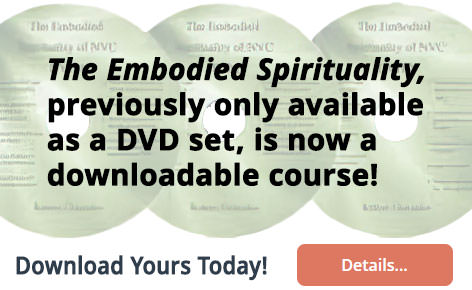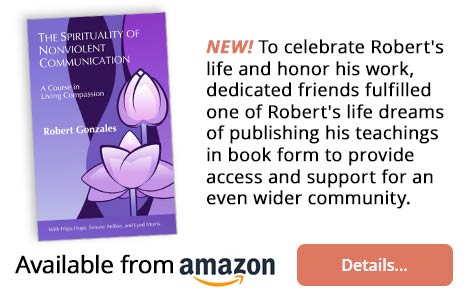

Welcome to the Robert Gonzales Training Legacy. Here you can learn more about Robert and the powerful teachings he dedicated his life to. NVC Academy is proud to house and share with you the complete body of his life's work. We invite you to explore, learn, and help keep his legacy alive!
Robert's passion was in the spirituality of the Nonviolent Communication (NVC) process. He saw NVC both as a process that helps people connect more authentically with themselves and others, and as a spiritual practice and way of living. The worldwide NVC community mourned when Robert died in 2021. He left behind a legacy of work that emerged from a lifetime of inquiry into the intersection between spirituality and human communication. More about Robert.
Audio
8 - 11 hours
Does your inner dialog sound supportive and encouraging - or more like you’re being yelled at by a critical task-master? Gain an understanding of the neuroscience of the left and right hemispheres of the human brain and locate just where this savage inner voice is coming from and how to respond to it with empathy.
Details...Trainer Tip
1 - 2 minutes
Trainer tip: Feelings of hurt, anger, fear, and resentment can often sound alike. Fear and excitement have the same physiological effects on us, and are often expressed in the same body language. Clearly and specifically naming our emotions and the intensity level can help us resolve conflicts, with a much greater opportunity to get our needs met.
Details...Join Susan Skye as she guides you to experience profound transformation of the inner jackal messages resulting from childhood trauma. Discover how the limbic system of the brain works, and transform jackal messages stored there with compassionate connection.
Details...Trainer Tip
1 - 2 minutes
Trainer tip: NVC focuses on shared human values and needs, and encourages the use of language that increases good will -- plus avoidance of language that contributes to resentment or lowered self-esteem. It emphasizes taking personal responsibility for choices and improving the quality of relationships as a primary goal. For today, focus on making observations without moralistic judgment in at least two of your interactions.
Details...Article
1-2 minutes
Here's a list of words that pose as feelings, but are actually interpretations of what you think someone is doing to you. They trigger defensiveness in another thereby preventing a connected dialogue. Behind each of these words are precious feelings and needs. This sheet includes ways to distinguish feelings from interpretations.
Details...Trainer Tip
1 - 2 minutes
Trainer tip: Beware that your expression of feelings helps you own how you feel, rather than blaming the other person for doing something you see as wrong. Expressing your feelings helps the other person know how deeply this issue affects you. Plus it can bring more clarity and connection to all parties. Read on for more.
Details...Audio
4 hours
A chosen, interdependent world… In most cases, that's sure not the world we live in today, is it. But it could be the world we live in tomorrow. And you can choose to be part of bringing that better world to life – to be part of a gradual, joyful transformation – simply by using the dynamic, living power of Dialogue.
Details...Practice Exercise
5 minutes
Listen to CNVC Certified Trainer Dian Killian guide and ease you into a more natural expression of empathy. This is a three person exercise. Listen in and then give it a try!
Details...Trainer Tip
1 - 2 minutes
Trainer Tip: Our particular needs and expectations in the moment, influences how we feel. So if you are feeling hurt, sad, angry, or disappointed, try to consider what your unmet needs are, and see if there are other ways you can get them met. Today, track how your needs affect your feelings.
Details...Article
3-5 minutes
Effective and connected dialogue requires significant self-awareness, mindfulness, and skill. You can focus on any of these six areas that most often escape your awareness: anchoring and staying grounded; boundaries; thoughts and beliefs; stuckness or attachment; feelings and needs; and requests. Read on for a list of questions to help you focus on how to do that.
Details...

